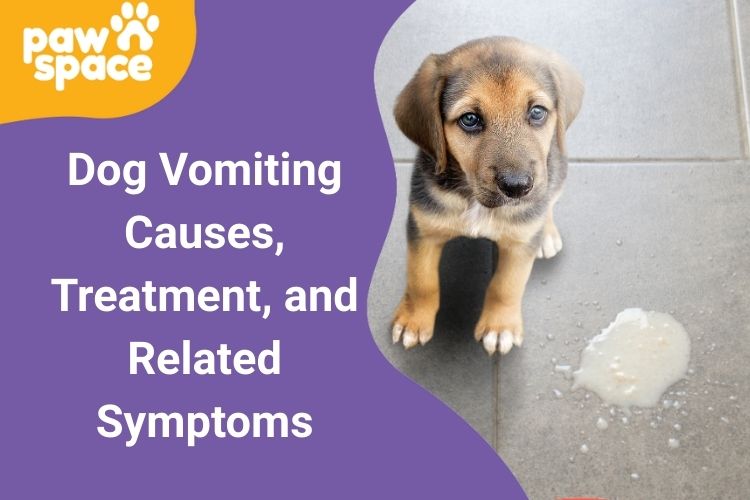As a conscientious dog parent, you should be, by now, aware that your canine companion cannot exactly voice his/her displeasure when they’re ill. Therefore, it is vital to be a good observer and notice the giveaway signs that all may not be well. Having a five essential signs checklist that your dog could be ill, can help you to make sure that they remain in the best of health.
Table of Contents
Toggle- Our Recent Web Stories
- 5 Signs of Dog Sickness
- 1. Changes in Appetite: The Hungry Hound Becomes a Picky Eater
- 2. Changed Drinking Habits: The Thirsty Pup
- 3. Lethargy and Reduced Activity: The Couch Potato
- 4. Vomiting and Diarrhoea: The Troubled Tummy
- 5. Changes in Behaviour: The Moody Mutt
- Make Sure To Be Your Dog’s Health Detective
- Pawspace: The safe space for your pets
- Why Choose Pawspace?
- FAQs Related to Signs of Dog Sickness
- 1. How do I know if my dog is ill?
- 2. What do I do if my dog is sick?
- 3. Can changes in behaviour be signs of sickness in dogs?
- 4. How frequently should I check the health of my dog?
- 5. What are some prevention steps to make my dog stay healthy?
Our Recent Web Stories
[web_stories title=”false” excerpt=”false” author=”false” date=”false” archive_link=”true” archive_link_label=”” circle_size=”150″ sharp_corners=”false” image_alignment=”left” number_of_columns=”1″ number_of_stories=”3″ order=”DESC” orderby=”post_title” view=”circles” /]
5 Signs of Dog Sickness
1. Changes in Appetite: The Hungry Hound Becomes a Picky Eater
Dogs adore their food, and most dogs jump for joy when mealtime arrives. So, when Fido suddenly wrinkles up his nose at his beloved kibble, it’s a warning sign. A loss of appetite or increase in appetite can be a sign of a number of different health problems, ranging from dental issues and gastrointestinal upset to more severe illnesses such as liver or kidney disease. Monitor their appetites, and if you see any dramatic changes, it’s time to call your vet.
Dogs are habitual animals, and their feeding habits can reveal a great deal about their health. Sudden loss of appetite could be because of something as mundane as a dental problem causing pain during chewing or an indication of more serious conditions like infections or systemic diseases. Conversely, sudden increase in appetite could be associated with conditions like diabetes or thyroid problems. It’s crucial to observe your dog’s feeding patterns on a regular basis and see a veterinarian if you find extreme changes.
2. Changed Drinking Habits: The Thirsty Pup
Just like with food, changes in your dog’s drinking habits can be a sign of trouble. If your pup starts guzzling water like they’ve been stranded in the desert, it might be a sign of diabetes, kidney issues, or hormonal imbalances. On the flip side, a decrease in water intake could indicate nausea or pain. Monitoring how much water your dog drinks can provide valuable clues about their health.
Increased thirst, or polydipsia, may be a sign of many underlying conditions. Diabetes mellitus, kidney disease, or hormonal conditions such as Cushing’s disease can result in increased water intake. In contrast, excessive reduction in drinking may point towards urinary tract infections, nausea, or even neurological conditions. Monitoring your dog’s water intake closely and having your vet check if you notice anything out of the ordinary can catch early signs of potential health issues.
3. Lethargy and Reduced Activity: The Couch Potato
Dogs are playful and curious animals. If your normally active dog becomes lethargic or loses interest in activities they previously enjoyed, it may be a sign that all is not well. Lethargy is caused by infection, pain, or chronic conditions such as arthritis. Be on the lookout for any sudden changes in their energy levels and consult with a veterinarian if your dog is excessively tired or lethargic.
Canine lethargy may be seen as oversleeping, indifference to play or walks, or overall lack of energy. One must distinguish between a naturally relaxed temperament and true lethargy due to illness. If your dog suddenly turns into a couch potato, it’s time to think about possible causes like infections (e.g., kennel cough, Lyme disease), pain (e.g., arthritis, injuries), or chronic diseases (e.g., heart disease, hypothyroidism). Early treatment and detection can be the difference between a speedy recovery and a healthy life for your dog.
4. Vomiting and Diarrhoea: The Troubled Tummy
No one enjoys cleaning up after doggy mishaps, but vomiting and diarrhoea are normal signs that your dog’s tummy is upset. Occasional incidents may not be anything to worry about, but frequent or severe occurrences can be a sign of gastrointestinal troubles, infection, or even poisoning. Monitor how often and how severely the symptoms occur, and don’t delay contacting your vet if they continue. Describing your dog’s diet and any recent changes can assist in diagnosing the cause.
Vomiting and diarrhoea may result from a wide range of causes, such as dietary indiscretion (consumption of something they shouldn’t), infections (parvovirus, giardia), food allergy, or more severe illness, including pancreatitis or intestinal obstruction. It’s critical to keep a close eye on your dog’s symptoms and consult with a veterinarian if they last longer than 24 hours, if there is blood in the vomit or stool, or if your dog becomes lethargic or dehydrated. Your veterinarian might suggest diagnostic tests like blood work, faecal examination, or imaging to establish the underlying cause and best treatment.
5. Changes in Behaviour: The Moody Mutt
Behavioural adjustments can be an obvious sign that something’s wrong. If your dog is more irritable, belligerent, or aloof, it could be a sign of physical pain or emotional upset. Arthritis, dental issues, or mental degradation in senior dogs can cause these to happen. Aside from these, stress or anxiety due to changes in their surroundings or schedule can also influence your pet’s behaviour. Monitoring and responding to these changes early on may enhance your dog’s quality of life.
Behavioural changes may be subtle or dramatic. An outgoing and social dog to become aloof or a relaxed dog to become snappish can both be indicators of unseen medical conditions. Pain associated with arthritis, dental issues, or injuries can make dogs more aggressive or withdrawn. Mental decline in ageing dogs, as with human dementia, can also result in changes in behaviour, including confusion, anxiety, or restlessness. Stressors from the environment, such as relocating to a new home or the addition of a new pet, can also affect your dog’s behaviour. Identifying these changes and consulting with your veterinarian can determine the underlying cause and appropriate treatment or assistance.
Make Sure To Be Your Dog’s Health Detective
Being alert and sensitive to the signs of illness in your dog can make a big difference in their health. By observing changes in appetite, water consumption, activity, gastrointestinal issues, and behaviour, you will be able to provide your pet with prompt medical treatment. Timely detection and treatment are important to keeping your dog healthy and happy.
As a responsible dog parent, it’s essential to have regular check-ups with the vet, feed your dog a balanced diet, and give your dog lots of exercise and mental stimulation. Being able to catch the warning signs of illness early will help you keep your dog happy, healthy, and prepared for all the adventures life has in store.
Pawspace: The safe space for your pets
We at Pawspace are dedicated to providing top-notch care and companionship for your beloved pets. Honoured to be India’s biggest pet-centred community! Created and curated by pet parents.
Our services include pet grooming, pet boarding, pet sitting, doorstep dog training, dog walking, pet taxi/cab, pet relocation, pet funeral, cat grooming, etc.
Why Choose Pawspace?
- Available on demand for pet parents everywhere
- Verified caregivers with a 5-point checklist & rigorous background checks
- Be at peace by receiving regular updates through chats, photos and videos
Also, check the frequent updates on our Pawspace Instagram page
FAQs Related to Signs of Dog Sickness
1. How do I know if my dog is ill?
Observe changes in appetite, water intake, activity, vomiting, diarrhoea, and behaviour. These are indicators that your dog may be ill.
2. What do I do if my dog is sick?
If you observe any signs of illness in your dog, visit your veterinarian for a proper examination and diagnosis. Early treatment can prevent more complicated health problems.
3. Can changes in behaviour be signs of sickness in dogs?
Yes, changes in behaviour, like more irritability, aggression, or withdrawal, can be signs of physical distress or emotional distress in dogs.
4. How frequently should I check the health of my dog?
Monitor your dog’s health regularly by watching their appetite and water intake, activity levels, and demeanor. Regular check-ups with the veterinarian are also necessary to ensure your dog stays healthy.
5. What are some prevention steps to make my dog stay healthy?
Get your dog on a balanced diet, regular exercise, and scheduled veterinary visits. Staying up to date with vaccinations and parasite control can also keep your dog healthy.


















